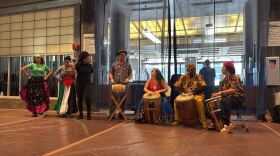There is nothing welcoming about the Law and Order Complex in East Baghdad. Essentially, it is a fortress — all 12-foot blast walls and guard towers.
To the people of Baghdad, it is known as the mini Green Zone. The Green Zone is the highly fortified compound in central Baghdad where the U.S. Embassy and the Iraqi government are located.
In this case, the name is ironic because the Law and Order Complex is decidedly monochromatic. The buildings are beige, the trailers are bland and the drives are either dirt or gravel. Judges live here, work here and in many ways are held prisoner here.
From the rubble of a dictatorship, Iraqis and Americans are working together to create a functioning judicial system in Iraq. It's proved a complicated and difficult task.
Secure Environment Key
William Gallo is the director of the Law and Order Task Force, an American military unit helping the Iraqi government to redesign the judiciary.
"We're in a counterinsurgency mindset right now, where people are attacking not only judges, but also Iraqi investigators and witnesses," says Gallo, who left his job as an assistant U.S. attorney in San Diego to help establish the Iraqi court system.
"In order for the system really to work, we have to provide a secure environment," he says.
That includes high walls and razor wire surrounding the judges' apartment buildings. Security crews pick up the judges, take them to a place inside the complex to eat, drive them to the onsite courthouse and then drive them home.
It is a stifling existence but, Gallo says, necessary. There are about 1,200 judges in all of Iraq — three-dozen of them have been murdered since 2003.
"If you can intimidate that aspect of the judicial system — the judges — then it doesn't matter how many witnesses you have and it doesn't matter how many investigators you have or prosecutors. If the judges don't feel they can make a decision in a secure environment that is fair and even-handed, then the whole system is going to crumble," he says.
Two Judicial Systems: Before Saddam and After
The judicial assassinations are only the beginning. The little hinges that make a judicial system function — legal traditions, precedents, even something as simple as court transcripts — just don't exist in Iraq.
Judge Faiq Zaidan, the chief investigative judge in one of Baghdad's Central Criminal Courts, has worked in the Iraqi legal system since 1999 — both before and after the rule of Saddam Hussein.
"During the Saddam era, justice wasn't independent. Before 2003, if a judge refused to listen to the suggestions of politicians, Saddam put him in jail," Zaidan recalls. "Now, we have to convince people we operate differently, independently."
Creating an Iraqi judicial system that inspires that kind of confidence is the job of Philip Lynch, the rule of law coordinator for Iraq. He says the experiences of the Saddam years continue to haunt the present. Witness intimidation, for example, is still a huge issue in Iraq.
"Witnesses sometimes are afraid to tell the truth because they're afraid that they will be killed or their families will be killed," Lynch says. "That's going to take some time."
Lynch says that judges also have to understand that no one in authority is going to tell them how to decide cases and that they are going to have to weigh the evidence and determine what happens. And that, he says, will take some time, too.
Teaching Basic Legal Concepts
The Iraqi judicial system is based on the French model. That means that evidence is gathered and processed by investigative judges who have wide powers, similar to those of a U.S. grand jury. The U.S. system is an adversarial system in which the prosecution, defense and judge all work independently. The idea is to challenge each other to come to a just, logical conclusion.
In Iraq, essentially one person does all that: the judge. And judges are having to adopt a whole new mindset, literally changing the way they view the law.
One extraordinary obstacle Lynch hadn't anticipated is that judges in Iraq believe they have an innate ability — a gut sense — that permits them to know when someone is lying or telling the truth.
"I ask a judge, 'How do you know if they are telling the truth or lying?' and they'll tell me, 'I'm a judge, I can tell,'" he says.
Instilling Confidence in the Iraqi People
As Lynch sees it, for the Iraqi people to have any confidence in the Iraqi court system, judges will have to operate differently: They will have to accept evidence and weigh the facts in open court. Soothsaying truth and falsehood won't work.
"I don't think the people of Iraq will ever have confidence in a judge's decision if that's what he bases it on," he says. "They need to understand that for the Iraqi people to have confidence in them, they need to explain what they are doing."
People like Haider Mousel need convincing. He has been in Rusafa prison for 18 months on terrorism charges. He says he is really a political prisoner, an Iraqi who followed the wrong political leader and that landed him in jail. As he sees it, justice in Iraq is all about politics, not evidence.
"There is no justice in Iraq," he says from one of the prison's detention centers. "The people in top positions don't care about people. They care about themselves. They used government money for themselves. Even the judicial system here is no good. I feel shame."
In the end, faith in the legal system is about more than just judicial reform. U.S. officials say it is the only way to end sectarian violence here. If Iraqis actually believe the courts will address their grievances — regardless of their sect or political affiliations — the hope is that they will then stop taking the law into their own hands.
Copyright 2022 NPR. To see more, visit https://www.npr.org. 9(MDAzMjM2NDYzMDEyMzc1Njk5NjAxNzY3OQ001))






